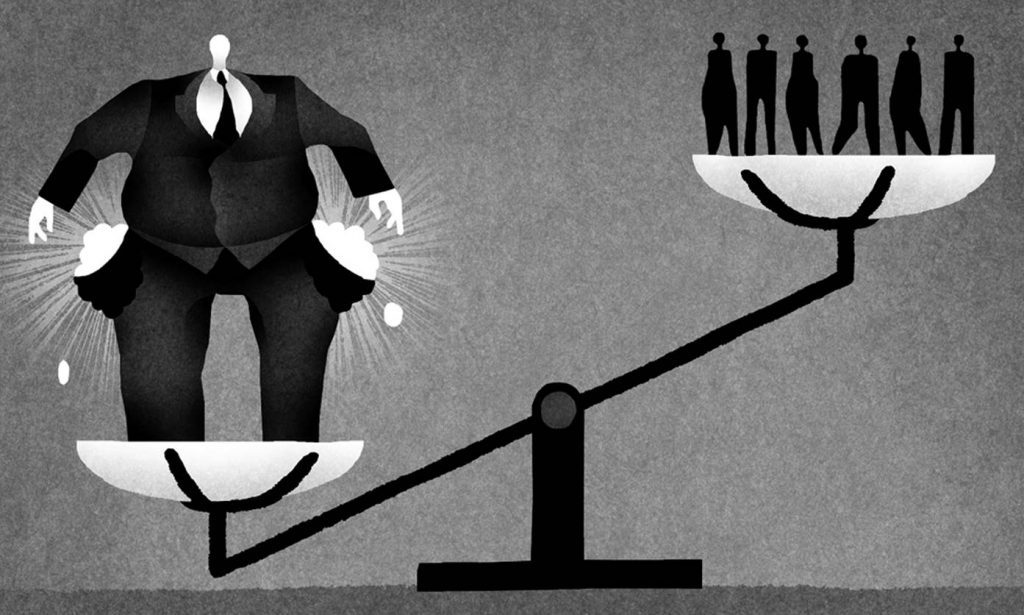
Current global inequalities.
by Cameron Taylor
We live in an age where, thanks to the internet, we are more connected to all other humans around the world than ever. Videos go viral frequently, people all over the world can make donations to charities they wouldn’t have heard of, people meet and collaborate all the time. However, we still live in a world with a great many issues – issues that I believe this relatively new interconnectedness could be vital in tackling. Inequalities exist within many nations but also between them. An inequality is a social relation – it is not a standard or a level as such but rather it is the difference between individuals. Just because somebody like an impoverished American might be financially well off compared to other countries in the world, they still suffer from inequality within their own nation compared to the elite classes.
Let’s look at financial inequality, for instance. It is common that we read headlines such as “eight people own the same wealth as half the world”. When you take a step back and think about it, that statistic is insane, to the point I feel people fail to grasp the magnitude of the inequality simply because they can’t comprehend either that amount of wealth nor of people. As we live in a global age, where businesses span continents and wealth moves so much more freely, it is important to look at the big picture between countries rather than focusing on individual nations. North America holds 6% of the world’s population.However, it has 37% of the world’s wealth. On the flipside, Africa has more than twice the population of North America and holds less than 1/10th of the wealth that North America has.
While it is true that in recent years income levels have risen in many places (such as China), the problem of inequality persists as while the working and middle classes may become wealthier, the elite classes earn exponentially more. The gap between the global elite and the rest of the world is still growing. This is a serious problem if it goes unchecked, but our current society and economies do not facilitate change. Oxfam is urging a rethink of business models, to focus on broader social impact rather than maximising shareholder returns. Winnie Byanyima, Oxfam’s executive director argues this is a sign that our economies are “rewarding wealth rather than the hard work of millions of people”. However, a criticism of this approach is leveled by some, arguing that reducing the wealth of the rich won’t lead to redistribution, and it simply limits the benefits of the rich’s wealth to nobody’s gain.
I believe that the correct way to approach the matter begins with a philosophical approach – we must ask ourselves: Is inequality inherently bad? Where does this inequality start? It is well known that people are presented with many different opportunities in life, with wealth aiding those opportunities massively in both quantity and quality. Perhaps, rather than looking towards taxes in order to solve this issue of inequality, we can try to find a solution which involves levelling the playing field, so to speak. Not to say taxes aren’t a valid option – many extremely wealthy individuals are presumably comfortable with paying higher taxes. Bill Gates, for example, claims that himself and other extremely wealthy people need to be paying significantly higher levels.
On the flipside, there is an argument that although the gap between the super rich and the rest has grown, global inequality has fallen. This argument comes from Sam Dumitru at the Adam Smith institute. This is to do with the developing world taking a more neoliberal approach, which reduces regulations and allows local industries to be more competitive. One must ask as well, even if gross inequality exists, perhaps it is not so much an issue as long as people no longer suffer or have restricted access to basic human necessities. Just because somebody is extremely wealthy, and somebody has nobody close to that much, as long as the poorer person does not suffer from current global issues such as lack of access to clean water, perhaps the issue isn’t so large. So would it not be better to aim to raise the overall quality of lives with a focus on those worse off rather than focusing on eradicating the inequality? The issue of global social inequality is an incredibly intricate one and no doubt something that will take many generations of adjustments to solve.

0 Comments